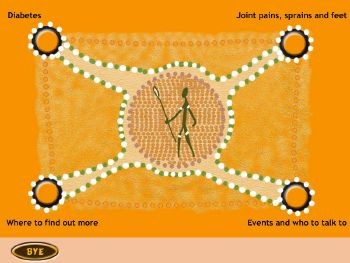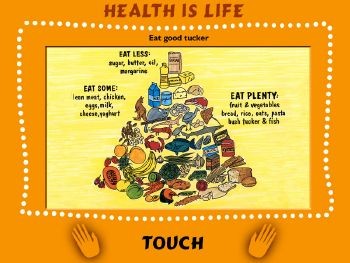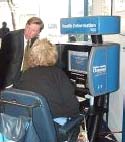Article
Keeping people healthy
Public health kiosks remain a niche industry in the United States, UK, and Australia. But advocates champion the application as a way of distributing information to a wider range of people.
February 27, 2002
Rugged and predominantly rural, the Australian state of Queensland is a long way from East Twickenham, Middlesex, England. But when the government there wanted to improve health care for Queensland's 48,000 Aboriginal residents, the grapevine led to East Twickenham, England and Julia Schofield.
Schofield directs Julia Schofield Consultants Ltd., a 20-employee company she founded with her husband David in 1983. The company creates multimedia kiosks for doctor's offices in the UK, and pharmaceutical firm GlaxoSmithKlein alerted the Queensland government to her work.
Schofield Consultants took on Queensland's pilot project -- two kiosks aimed at educating Aborigines, Australia's indigenous people, about diabetes and related problems. But the prospect of flying to the other end of the world did not stir the travel impulses in Schofield.
"I'm not desperate about huge air trips and I seem to have inherited some of the longest," Schofield said.
Schofield, however, does love creating unique ways of educating people about health care. It is a niche her company developed while making kiosks for retail clients such as Marks & Spencer, Laura Ashley, and the Korean car company Daweoo.
Learning how to create consumer friendly retail applications in durable enclosures prepared the company well for working in the public health domain. Schofield's touchscreen machines feature carefully scripted presentations and friendly, informative graphics, such as the soulful Aboriginal artwork that highlights the Queensland kiosk.
 |
Julia Schofield Consultants Ltd. used aboriginal-themed imagery in designing a kiosk for the government in the Australian state of Queensland. |
"I think actually making health topics people friendly, which often doctors are not, is really important, and so I'm interested in how that's done," she said.
Despite the passion that Schofield and others bring to their work, public health kiosks remain a small, niche market in the UK, Australia, and the United States.
Big projects, small projects
Some projects in the UK and Australia include hundreds of kiosks, others just a handful.
On the plus side, Britain's National Health Service (NHS) Direct pilot project, created by Action MultiMedia Ltd. of Birkenhead, Wirral, England, includes 153 kiosks and could grow to 500.
The service, available at groceries, pharmacies, NHS walk-in centers, and emergency rooms, provides touchscreen access to NHS Direct's Web site. The program allows users immediate access to health information and NHS services.
The government in the Australian state of Victoria contracted pieNETWORKS Ltd. of Perth, Australia, to develop 130 kiosks that access the government's Better Health Channel Web site. The 30-employee firm, started 4 ½ years ago, was able to use its Internet public access software for the project.
"(The Victorian government) found that the (number of) people accessing the network was a bit on the small side," said Bryan Paul, pieNETWORKS product sales manager. "They needed access to this Web page widely available and free in an environment where people felt safe, in an environment where they were most likely to have the information."
Other projects are smaller. Schofield's Queensland project is one example. Schofield turned to NCR Corp.'s Australian division, which provided installation and support of two NCR 7401 Web kiosks that enclose her company's software.
Another involves Britain's NHS Trust, which has one breast cancer education kiosk created by Newport, Essex, England-based Connect Interactive and has ordered a diabetes education kiosk.
An American struggle
Unlike the UK - where the government subsidizes much of the healthcare system - the United States depends on commercial interests to develop and operate most of the healthcare infrastructure.
American companies have attempted public health kiosks. But many of these projects failed. Cardinal Health, Blue Cross Blue Shield, Familymeds Inc., and the Mayo Clinic all gave up on kiosk projects. Another project, by Atlanta-based Helios Health Inc., failed when the company declared Chapter 7 bankruptcy in May, though the kiosks and Web site were later purchased by another healthcare company.
The Mayo Clinic kiosks made it into Target stores in Arizona. Located at the ends of aisles, the kiosks sold products such as CDs, books and newsletters. But the project had flaws, including the amount of text it produced. Francie Mendelsohn, president of kiosk consulting firm Summit Research Associates Inc., said one topic, coughs and colds, printed out 28 pages of information.
"It was one of the worst kiosks I ever saw," Mendelsohn said.
Healthcare kiosks: a few examples Queensland, Australia: The state government is using two kiosks to educate Aborigines about diabetes and related problems. |
A different problem, market factors, doomed the Familymeds kiosk project. Located in the company's pharmacies, the kiosk connected consumers to the Familymeds.com Web site, which allowed registered customers to purchase prescriptions and over the counter medicines and access health information. But while the Web site is still active, the company backed away from kiosks.
"The rationale from a business point of view was very solid," said Marvin Elbaum, former director of client and partner services for NetKey, which developed the kiosk software for Familymeds. "It's just a matter of the economy and funding they were supposed to get, and business needs that will be straightened out once the economy gets back to funding ventures like this."
In August, HealthCare Integrated Services Inc. purchased Helios Health's Web site and 1,381 kiosks. Barry Crescenzi, HealthCare director of business development, said the company plans to make the kiosks profitable by selling sponsorships to drug companies (see The business died, but Helios Health's assets live on.)
Making it pay
Funding kiosk projects through advertising is one way to make the projects profitable, and the drug companies are a willing suitor according to Mendelsohn.
"The pharmaceutical companies are chomping at the bit to do this. They want to be players," she said.
 |
Eating healthy is one of the main themes of the Queensland government's kiosk. |
The concept of drug companies buying advertising on a public health kiosk raises an objectivity red flag. But Dr. Graham Hughes, a rheumatologist and head of the Lupus Research Unit at St. Thomas' Hospital in London, said he was receptive to drug company sponsorship.
"I would absolutely be for it," said Hughes, who employs a Schofield Consultants kiosk to inform his patients about rheumatic diseases. "I have no qualms about the private industry being involved, because I don't think they would have any control over the content of the actual things; we would write that. I would have thought from the start that would have been the way forward, actually."
He does, however, advocate a cautious approach when seeking sponsors.
"You'd have to be careful. If the text slightly favored one (drug) and then the advert popped up on the next page, it would look wrong," he said.
An American comeback
HealthCare's entrance in the market may be a signal that the U.S. market is ready to try again. Several public-sector projects have already debuted.
Mille Lacs County, in east central Minnesota, installed five kiosks at hospitals, libraries, and government centers in the county. The kiosks, purchased by the Mille Lacs County Public Health Department in September of 2000, provide a directory of non-profit and county, public health services to county residents. On a larger scale, the American Heart Association and American Pharmaceutical Association (APhA) Foundation are experimenting with a heart disease education kiosk at a Ukrop's pharmacy in Richmond, Va.
An experiment to evaluate the role of pharmacies in healthcare education, the program will expand to five kiosks in a few months.
Ben Bluml, APhA Foundation vice president for research, believes kiosks can assist healthcare organizations in improving basic health.
"Any time you improve access to or availability of health information that is specifically tailored to individuals we believe that is contributing to the public health agenda," Bluml said.
Getting on board
Kiosk manufacturers cite three reasons why public health kiosks are attractive to government agencies, doctors, and health care groups: accessibility to information, privacy, and efficiency.
 |
The disabled can access pieNETWORKS's Better Health kiosks for the Australian state of Victoria. |
Kiosks can be utilized in healthcare environments, such as hospitals, pharmacies, clinics and doctors offices, and ambulatory care and outpatient pharmacies. They can also branch out beyond those settings.
"You can deploy it into public areas like libraries," Roberts said.
"You can provide that information to a socioeconomic group who may not have access to Internet technology," Roberts added. "You can provide that interface to those socially excluded who would not be familiar with driving a PC."
Paul said once users become familiar with the kiosks, they will become more curious about the Internet. That may encourage people to use computers at their library, for example, to continue their health education by browsing health Web sites.
"What our kiosk has done is remove the mystique with the Internet," he said.
Privacy - such as the concept of doctor-patient privilege - is an important aspect of the healthcare experience. Kiosks, in a sense, add to that element.
"(A kiosk) can provide information that might be embarrassing if you were to ask your pharmacist," Mendelsohn said.
Reducing the workload on staff members is one of the goals of the NHS kiosks.
"At the NHS, like lots of state health provisioners, there's an over-demand on its services," Roberts said. "The object of this (the kiosks) is to provide a triage service. Triage is about, if you like, trying to provide a means of redirecting people to other sources, whether it's a pharmacy or a doctor rather than going straight to the doctor in the first instance."
Talk about the passion
But developing a public-health kiosk project can be risky because creating new, interesting and accurate content is expensive.
Schofield's kiosks can range in price from about $6,000 to $11,500. But the cost of producing one of her specialty Medibooks software packages can range from $8,500 and $30,000, depending on its complexity.
"Complex medical graphics are expensive," Schofield said.
The content for Hughes's kiosk was expensive because it covered ten diseases and contained 2 ½ hours of information. Though the cost was high, he appreciates what the kiosk does for his patients.
"They go into the doctors and they go out often with a blur. They don't really remember what they should have asked," he said, explaining that the kiosks reinforce his instructions.
It is clear that Hughes and Schofield are enthused about public health kiosks. Though it is a niche market that can require much globetrotting, developing public health kiosks can be a satisfying endeavor.
"With all the struggles getting them done it's well worth it when you watch them being used," she said.






